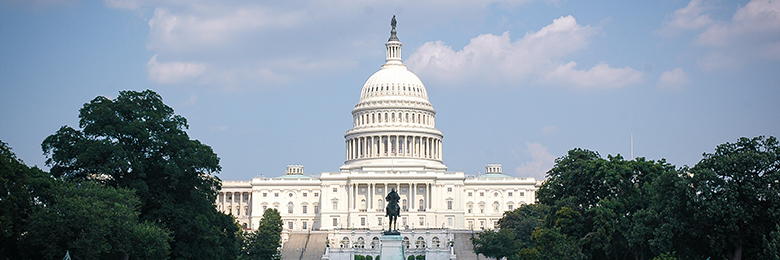2019 U.S. Policy Outlook: Trade, Fiscal Stimulus, and Political Controversy


In her blog post below, Libby briefly maps out her outlook for 2019. She believes politics and policy out of Washington will continue to drive – and in some cases, weigh on – markets, much like they did in 2018. Investigations and manufactured crisis are likely to contribute to uncertainty. Trade tensions persist, though on a more positive note, relations between the U.S. and China seem to be improving.
-Kristi Kuechler, Managing Director, Investor Market, Family Office Exchange
Trade policy
Back in early 2018, we flagged trade policy as a primary risk for the markets for several reasons:
- The White House can influence trade policy largely without Congress
- Trade issues poll well with President Donald Trump’s base
- Most importantly, it is a policy issue on which President Trump has deep-seated and longstanding views
One year later, we continue to believe that trade policy poses a risk to the markets. Foremost, we don’t think congressional ratification of the USMCA (aka NAFTA 2.0) will be straightforward under a Democrat-led House of Representatives. House Democrats tend to be skeptical of free trade deals, especially as they relate to labor and environmental issues. Also, we see little incentive for Speaker Nancy Pelosi to bring up the USMCA for a vote, thereby handing a win to the president. We would not be surprised if the president responds to any delay of a vote by following through on his threat to withdraw the U.S. from NAFTA, which in our view would be a risky strategy and would weigh on markets.
In addition to risks around the USMCA, we also believe that tariffs on autos and auto parts remain a possibility, with action, should it come, occurring this spring.
On a more positive note, relations between the U.S. and China seem to be improving. A commitment to keep negotiating would likely delay the March 1 increase of tariffs to 25% on $200 billion of Chinese goods. The Trump administration’s concerns regarding China’s industrial policy still stand (e.g., state subsidization of the private sector, forced technology transfer), but the president, who is sensitive to financial markets and economic concerns over the trade tensions, may be more inclined to take a smaller deal in the name of a political victory.
Fiscal stimulus
We estimate the fiscal stimulus from the 2017 tax bill and 2018 spending bill will contribute 0.4 percentage points to real growth in 2019, but we expect that stimulus to fade as the year goes on, and importantly, we do not expect additional fiscal stimulus at this point. An infrastructure deal is still possible, but the question of how to pay for it will invariably arise, not to mention we think the political window to get such a deal is relatively small – probably the first half of 2019.
Manufactured crises: Shutdown and debt ceiling
With no resolution in sight on the government shutdown, investors may question whether we could see the same type of brinkmanship around the debt ceiling, which by law will need to be increased by March 1 (though the deadline could be extended into the summer via “extraordinary measures”). While it is certainly possible that the debt ceiling could be weaponized to extract policy concessions as it has in the past, we think it is significantly less likely under this new Congress. The House recently passed a modified so-called Gephardt rule, which would automatically raise the debt ceiling when the House passes a budget, thereby eliminating the need for a separate House vote. While it is true that the Senate would still need to take a separate vote to raise the debt ceiling, and the president could still make it an issue, we think the odds of a debt ceiling crisis have materially decreased, which is good news for the markets.
Investigations and impeachment
With House Democrats having subpoena power and controlling the agenda at the committee level, we should expect significantly more oversight and investigations into every level of the Trump administration, making it more challenging for the administration to advance policy issues or even attract new staff.
At the same time, we believe Democratic leaders who say that they have no intention of impeaching President Trump at this point and in a partisan way – i.e., they would only advance impeachment on a bipartisan basis. We also don’t believe there will be any serious consideration of impeachment until Special Counsel Robert Mueller’s investigation into Russian efforts to interfere in the 2016 election concludes, whenever that is. Nevertheless, the specter of the investigation and impeachment will likely cast a shadow over Washington in 2019.
About the author

Here Libby speak about the Impact of Policy and Politics on Global Investment Markets at the 2019 FOX Global Investment Forum, March 13-14 in New York.
